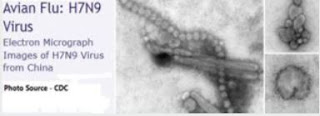#12,041
The number of new H7N9 infections in Mainland China continues to rise, with an unusual (for China) mid-month announcement that between Jan 1st - Jan 15th another 84 cases were reported to the NFHPC. Some of these cases had onset in December.
According to the HK CHP's numbers, that brings this winter's tally (since November) to 227 cases, although that number already appears to be out of date (Hunan Province has reported at least 5 cases since the 15th).
This is - by far - the fastest, and most intense early start to China's yearly H7N9 epidemic, which began in 2013. This from Hong Kong's CHP, after which I'll return with more.
The Centre for Health Protection (CHP) of the Department of Health today (January 20) received notification from the National Health and Family Planning Commission that 84 additional human cases of avian influenza A(H7N9), including seven deaths, were recorded from January 1 to 15. The CHP strongly urged the public to maintain strict personal, food and environmental hygiene both locally and during travel, in particular during the upcoming Lunar New Year holidays.
The 60 male and 24 female patients aged from 3 to 79 had their onset from December 13, 2016 to January 13, 2017. The cases were from Jiangsu (34 cases), Zhejiang (23 cases), Anhui (14 cases), Fujian (five cases) and four cases each in Hunan and Jiangsu. Among them, 28 reported exposure to poultry or poultry markets while the source of infection of 52 cases was still under investigation.
"Since November 2016, the Mainland health authorities have already recorded 227 human H7N9 cases thus far. We would also like to remind the public that human H7N9 cases continue to occur in neighbouring Guangdong and the positive percentage for H7 virus of environmental samples is substantial. We again urge the public to pay special attention to health risks of the places of visit," a spokesman for the CHP said.
"While local surveillance, prevention and control measures are in place, we will remain vigilant and work closely with the World Health Organization and relevant health authorities to monitor the latest developments," the spokesman said.
As the H7N9 virus continues to be detected in animals and environments in the Mainland, additional human cases are expected in affected and possibly neighbouring areas. In view of the heavy trade and travel between the Mainland and Hong Kong, further sporadic imported human cases in Hong Kong every now and then are expected, especially in the coming few months.
"Therefore, we strongly urge the public to avoid touching birds, poultry or their droppings and visiting poultry markets or farms during travel, particularly in the upcoming Lunar New Year holidays. If feeling unwell, such as having a fever or cough, wear a mask and seek medical advice at once. Travellers returning from affected areas should consult doctors promptly if symptoms develop, and actively inform the doctors of their travel history for prompt diagnosis and treatment," the spokesman added.
The CHP's Port Health Office conducts health surveillance measures at all boundary control points. Thermal imaging systems are in place for body temperature checks on inbound travellers. Suspected cases will be immediately referred to public hospitals for follow-up.
The display of posters and broadcasting of health messages in departure and arrival halls as health education for travellers is under way. The travel industry and other stakeholders are regularly updated on the latest information.
The public should maintain strict personal, hand, food and environmental hygiene and take heed of the advice below while handling poultry:
- Avoid touching poultry, birds, animals or their droppings;
- When buying live chickens, do not touch them and their droppings. Do not blow at their bottoms. Wash eggs with detergent if soiled with faecal matter and cook and consume them immediately. Always wash hands thoroughly with soap and water after handling chickens and eggs;
- Eggs should be cooked well until the white and yolk become firm. Do not eat raw eggs or dip cooked food into any sauce with raw eggs. Poultry should be cooked thoroughly. If there is pinkish juice running from the cooked poultry or the middle part of its bone is still red, the poultry should be cooked again until fully done;
- Wash hands frequently, especially before touching the mouth, nose or eyes, before handling food or eating, and after going to the toilet, touching public installations or equipment such as escalator handrails, elevator control panels or door knobs, or when hands are dirtied by respiratory secretions after coughing or sneezing; and
- Wear a mask if fever or respiratory symptoms develop, when going to a hospital or clinic, or while taking care of patients with fever or respiratory symptoms.
The public may visit the CHP's pages for more information: the avian influenza page, the weekly Avian Influenza Report, global statistics and affected areas of avian influenza, the Facebook Page and the YouTube Channel.Ends/Friday, January 20, 2017Issued at HKT 18:11
In addition to Hunan, as of last night reporting 13 cases when today's announcement by Hong Kong only brings their total to 7, there is no mention of January cases from Guangdong province in this update, which is only second to Zhejiang Province in the total number of cases reported.
Given China's reluctance over the past two years to release H7N9 numbers in anything resembling `real time', today's announcement - just 11 days after announcing 83 mainland cases in December - is a pretty good indication that the size and scope of this year's epidemic continues to rise.With the Chinese New Year just over a week away, and millions of people already traveling to visit their families across Asia - often in overcrowded buses and trains - public health officials around the world are on heightened alert for the possibility of seeing imported cases (see H7N9: Korean CDC Warns Travellers To China During Seollal).
Stay tuned.
